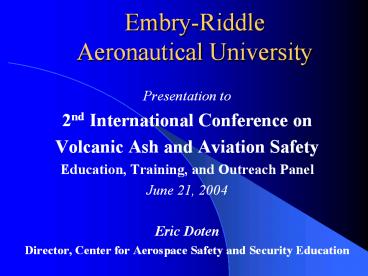Embry-Riddle Aeronautical University - PowerPoint PPT Presentation
1 / 17
Title: Embry-Riddle Aeronautical University
1
Embry-Riddle Aeronautical University
- Presentation to
- 2nd International Conference on
- Volcanic Ash and Aviation Safety
- Education, Training, and Outreach Panel
- June 21, 2004
- Eric Doten
- Director, Center for Aerospace Safety and
Security Education
2
Embry-Riddle Aeronautical University
..Leading the World in Aviation and Aerospace
Education
3
Extended Campus
Daytona Beach Campus
Extended Campus
185 acre campus 5000 full-time students 32
Undergraduate and Graduate degree
programs Developing Research Park
Incubator 1500 Employees 500M Local Economic
Impact
4
Extended Campus
Prescott Campus
Extended Campus
565 acre campus 1800 full-time students 28
Undergraduate and Graduate degree programs 500
Employees 180M Local Economic Impact
5
Extended Campus
Extended Campus
Extended Campus
130 Centers World-wide Touch professionals
already doing the real work of aviation and
aerospace 10 Undergraduate and Graduate degree
programs 21,000 students
6
Undergraduate Academic Programs
- Computing Mathematics
- B.S. in Computer Science
- B.S. in Software Engineering
- Engineering
- B.S. in Aerospace Engineering
- B.S. in Civil Engineering
- B S. in Computer Engineering
- B.S. in Electrical Engineering
- Engineering Technology
- B.S. in Aircraft Engineering Technology
- B.S. in Avionics Engineering Technology
- Human Factors
- B.S. in Human Factors Psychology
- Physics
- B.S. in Engineering Physics
- B.S. in Space Physics
- Science, Technology, Globalization
- B.S. in Global Security and Intelligence Studies
- B.S. in Science, Technology and Globalization
- Aeronautics
- B.S. in Aeronautics
- Aeronautical Science (Flight)
- B.S. in Aeronautical Science
- Aerospace Studies
- B.S. in Aerospace Studies
- Applied Aviation Sciences
- B.S. in Aeronautical Systems Maintenance
- B.S. in Air Traffic Management
- B.S. in Applied Meteorology
- B.S. in Safety Science
- Business Administration
- B.S. in Aviation Business Admin
- B.S. in Aviation Management
- B.S. in Technical Management
- Communications
- B.S. in Communications
7
Graduate (Masters) Academic Programs
- Aeronautical Science
- Provides opportunity for flight crew,
- air traffic controllers, flight operations
- specialists, industry technicians and
- aviation educators to enhance their
- knowledge
- Aerospace Engineering
- Augments engineering and science backgrounds for
careers in aerospace and research and development - Technical Management
- Builds the communication management skills
needed in technically oriented enterprises - Human Factors Systems
- Develops the capacity to design, conduct and
apply human factors research in support of the
design of simple complex systems
- Business Administration
- Management concepts, methods and tools applied
to the challenges of aviation - Software Engineering
- Enhances opportunity to work in the cutting edge
of modern software development - Space Science
- Diverse set of research and designing skills in
the areas of space science and engineering - Safety Science
- Produces professionals who are skilled in
providing safety management expertise and
guidance in compliance issues. - Occupational Safety Management
8
Faculty Areas of Interest and ExpertiseThe Real
Character of the Faculty (Research Capability)
- Aviation Safety, Crashworthiness, Accident
Investigation - Aviation Security and Intelligence, Terrorist
threat assessment/mitigation - General Aviation Research
- Aerospace, Computer, Software, Electrical, and
Civil Engineering - Air Traffic Management Airspace Modeling
Airspace Redesign - Software Safety Critical Systems Medical/Cockpit
Systems - Bio-Medical Engineering
- Aviation Management Entrepreneurship Economic
Impacts - Market Research Market Assessment Logistics and
Product Life Cycle - Operations Research Systems Optimization
- Management of Airline, Air Cargo, Market Research
- Environmental and Ecological Issues at Airports
- Applied Space Engineering and Research Space
Debris Hypervelocity Impact - Space Physics, Payload Structures
- Upper Atmosphere Physics and Space Weather
- Meteorology Research and Weather Prediction
- Engine Design and Propulsion Exotic Propulsion
9
Industry Relationships
? Boards of Visitors ? Industry Advisory
Councils
10
Department of Applied Aviation Sciences Embry-Ridd
le Aeronautical University
11
Applied Meteorology
- 119 Majors
- 180 Minors
- 9 faculty
12
Areas of Concentration
- Flight Weather
- Students complete a minor in Aeronautical Science
and are eligible to take the FAA Dispatcher
Certification exam. - Commercial Weather
- Students complete a minor in business, giving
them a better sense of the business decision
making process of those that they advise. - Media Weather
- Students complete a minor in communications, thus
giving them the formal training to help make them
effective communicators. - Research
- Students may complete a minor in Mathematics by
careful planning and one additional course (as
part of their general elective credits).
13
(No Transcript)
14
Applied Meteorology
15
Developing Projects
- Assessment of Wx Products by the FAA from a cost
perspective - Graphical Area Forecast for human factors
assessment of product displays in 4D. - Study to assess pilots ability to interpret
radar data - Dialog with USAF Reserves Weather Readiness
Training Center to develop materials for their
weather training program - Soliciting NSF funding for web-based tool on
satellite atmospheric observation - Soliciting NSF funding for Supercomputer to
utilize ensemble forecasts
16
Public Outreach
- Community Hurricane Preparedness Workshop
Spring 2000 - Multiple Lightning Safety Presentations
- Flight Instructor Refresher Clinics
- Teaching Airports Wx and Air Traffic Information
Kiosk located in the DBIA terminal.
17
Student Newsletter
- .































